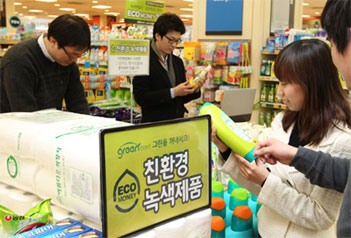South Korea passed legislation to begin a national cap-and-trade program with a near unanimous vote of 148-0, with three abstentions.
The fourth largest economy in Asia, South Korea is the fastest growing source of greenhouse gas (GHG) emissions among industrialized countries, doubling since 1990. It is the 8th biggest source of GHG emissions in the world and has a national target of cutting them 30% by 2020.
POSCO, the world’s third largest steelmaker, and Samsung Electronics, the largest electronics manufacturer, are among South Korea’s biggest polluters.
Emissions trading is scheduled to begin in Korea in 2015, the same year as those in Australia and China. New Zealand started emissions trading in 2009, and the EU’s went into effect in 2005. South Africa has plans for a program. In the US, the northeastern states have a cap-and-trade program, California‘s begins in 2013.
In April, both Mexico and Peru passed national climate change legislation.
This opens the possibility of linking country cap-and-trade programs – allowing participants to trade regionallly and eventually worldwide – which would raise the value of carbon markets substantially.
South Korea’s program will cover about 60% of emissions and affects big polluters across the economy, including utilities, major manufacturers such as steel, petrochemicals and ship-building, livestock farms and even large universities. It focuses on operations that emit over 25,000 tons of carbon a year.
Participants will have the option of meeting the mandatory carbon cap by trading emissions permits or buying carbon offsets from United Nations-backed clean energy projects in developing countries.
Because of industry pressure, the plan has been delayed several times and the final version is watered down, giving away 95% of permits for free until 2020 and softening penalities for non-compliance. Remaining permits will be auctioned.
The Federation of Korean Industries and Korea’s Chamber of Commerce & Industry voiced familiar concerns as they worked to delay the program: it raises industry costs and makes it hard to compete with countries that don’t have cap-and-trade, namely the US and Japan.
Lawmakers say it will make the economy more energy-efficient and increase competitiveness by exporting green products. The country will benefit by importing less oil and gas – it’s the world’s fifth-largest oil importer and second largest importer of liquefied natural gas.
"This is to develop green industry technologies and technology to reduce energy consumption, and develop those as one industry … ultimately we want to organize markets for green business ahead of other countries," Yang Soogil, chairman of the Presidential Committee on Green Growth, told Reuters.
Korea’s government managed to pass the legislation over industry objections, in part because political leaders want the citizenry to see they are not ruled by corporations, reports Reuters. Sound familiar?
In preparation for the cap-and-trade program, almost 500 major polluters face pollution caps this year.
A feed-in law has been in place since 2002 to incentivize growth in renewable energy, but starting this year, it will be replaced by a national Renewable Portfolio Standard, which requires utilities to source 2% of energy from renewable sources. It rises to 10% by 2022.
South Korea’s GreenCard
One of the ways the government is trying to reduce emissions is by distributing GreenCards.
The Ministry of Environment has issued GreenCards to 2 million people over the past nine months after being introduced last July. That’s about 10% of the economically active population.
Along the lines of a credit card, GreenCard-holders get points (which can be turned in for cash) when they purchase environmentally responsible products or reduce household energy use.
People earn points when they recycle used batteries, buy a green-rated detergent or instead of using plastic take-out packaging, they bring their own.

In December, they introduced a corporate GreenCard, which allows local governments and businesses to participate in the points and benefits program.
The Ministry is continuing to expand the line of products that qualify for GreenCard points as well as partners such as retailers and supermarkets.
The City of Seoul offers an eco-mileage credit card, which gives discount coupons toward buy efficient appliances and hybrid cars, for example, when they conserve energy and water.
